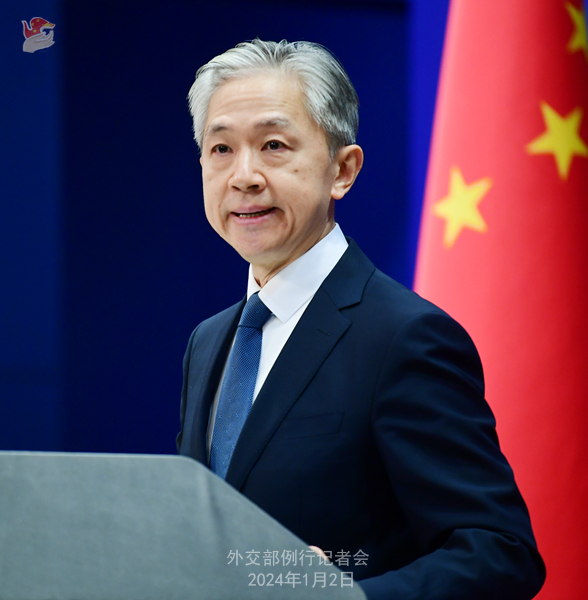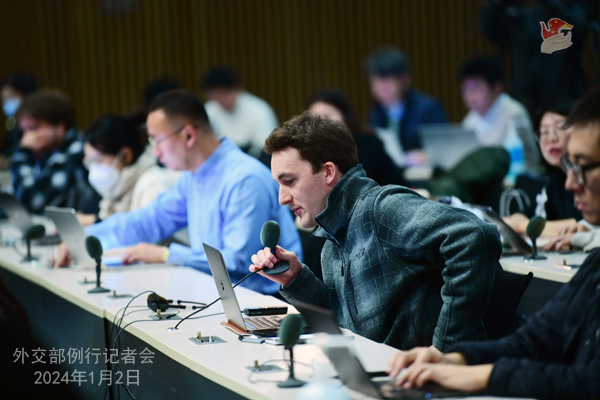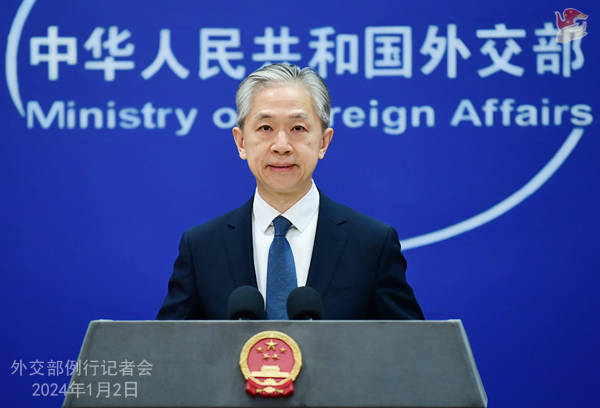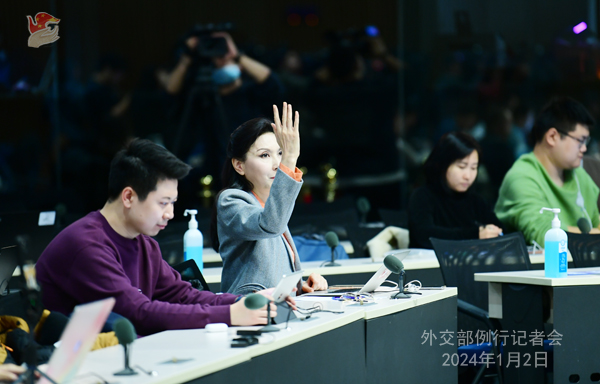
CCTV: President Xi Jinping’s new year address has received close attention from home and abroad. Many in the world believe that the address conveys China’s confidence and strength in its development and shows the world a thriving, confident and open China. We noted that in his 2024 new year address, President Xi Jinping stressed that China “will work closely with the international community for the common good of humanity, build a community with a shared future for mankind, and make the world a better place for all.” What efforts will China make through its diplomacy to advance this cause in 2024?
Wang Wenbin: In his new year address delivered on the eve of the new year, President Xi Jinping reviewed China’s remarkable achievements in 2023 and presented a bright outlook of the Chinese people continuing to forge ahead with resolve and tenacity for their dreams in 2024. He also expressed China’s sincere wish to work together with other countries for a future that belongs to all. It was truly uplifting and inspiring.
The year 2023 that has just passed witnessed China’s sense of responsibility as a major country to bring stability and certainty to a turbulent world filled with uncertainties. In 2023, China successfully held the China-Central Asia Summit, the Third Belt and Road Forum for International Cooperation, the Chengdu Summer Universiade and the Hangzhou Asian Games to promote peace and development as the underlying trend of the international landscape and deliver cooperation for mutual benefit with the rest of the world. President Xi paid four overseas visits and attended a number of international conferences where he met with friends, both old and new, with whom he shared China’s vision, enhanced common understandings and conveyed China’s confidence in working with the world to meet challenges and overcome difficulties. The world saw more clearly that China is not only committed to its own development, but also actively embracing the world.
This year, we will celebrate the 75th anniversary of the founding of the People’s Republic of China. On the new journey ahead, we will be guided by Xi Jinping Thought on Socialism with Chinese Characteristics for the New Era and Xi Jinping Thought on Diplomacy in particular and always bear in mind the goals and tasks for Chinese modernization. We will stay confident, stand on our own feet, promote openness and inclusiveness, uphold fairness and justice and pursue cooperation for mutual benefit. We will focus on building a community with a shared future for mankind, step up to our historical responsibility and work with a greater innovative spirit to open up new prospects in our major-country diplomacy with Chinese characteristics, bring countries together to meet challenges and achieve prosperity for all, and usher in a bright future of peace, security, prosperity and progress for our world.
AFP: The Thai Prime Minister has reportedly said today that Thailand and China will cancel certain visa requirements for each other’s citizens in March this year. Can you confirm this? And if so, could you please provide more detail about the types of visas that will be waived under this new policy?
Wang Wenbin: To further enhance people-to-people exchanges and mutually exempt visas between China and Thailand serves the fundamental interests of both peoples. The government departments responsible for the matter are in close communication on the specifics. We look forward to the early implementation of the arrangement.

China Daily: It was reported that the first meeting of the sub-committee on China-Uzbekistan poverty reduction cooperation was held via video link on December 29, 2023, where new consensus was reached on deepening cooperation on poverty reduction in the next stage. What is China’s comment?
Wang Wenbin: As agreed between the heads of state of the two countries, China and Uzbekistan set up a sub-committee on poverty reduction cooperation under the framework of the intergovernmental cooperation committee during the China-Central Asia Summit last May. This is the first sub-committee on poverty reduction that China established with other countries at the governmental level. The success of the first meeting of the sub-committee marks the official launch of the China-Uzbekistan poverty reduction cooperation mechanism and opens a new chapter of poverty reduction cooperation between the two countries.
Poverty is a scourge for humanity and a common challenge facing the whole world. The Chinese government always puts rural development and poverty reduction as a priority of the governance of the country. We have pooled resources to win the battle against poverty and hit the targets of the UN 2030 Agenda for Sustainable Development 10 years ahead of schedule. At the moment, China is advancing the cause towards a strong and prosperous country and national rejuvenation in all respects through Chinese modernization. As a Chinese saying goes, “A single flower does not make spring, while one hundred flowers in full blossom bring spring to the garden.” Only development for all is true development. China stands ready to work with all countries to realize modernization of the world featuring peaceful development, mutually beneficial cooperation and common prosperity and build a community with a shared future for mankind.
China News Service: It was reported that on January 1, powerful earthquakes hit Noto region in Ishikawa Prefecture of Japan and triggered a tsunami. By the morning of January 2, the earthquake has left over 20 dead and Ishikawa Prefecture and several other regions badly stricken. Has China extended sympathies to Japan? Any measures taken by China to protect Chinese nationals there?
Wang Wenbin: Yesterday, powerful earthquakes hit Noto region in Ishikawa Prefecture of Japan, causing casualties and damage of property. We express our condolences over the loss of lives and our sympathies to the families who have lost loved ones and those who have been injured. The Chinese Embassy in Japan and Consulates-General in Nagoya and Niigata immediately activated the emergency response mechanism and issued consular notices. So far, there have been no reports of Chinese casualties. The Foreign Ministry and our embassy and consulates in Japan will continue to follow the situation closely and provide timely and necessary assistance to our nationals in Japan.
Bloomberg: It’s been reported that the US asked Dutch company ASML to hold shipments of lithography machines to China in advance of a ban that will be implemented later this month. Does the foreign ministry have any comment?
Wang Wenbin: We noted relevant reports. China opposes the US’s overstretching the national security concept and using all sorts of pretexts to coerce other countries into joining its technological blockade against China.
Semiconductor is a highly globalized industry. In a deeply integrated world economy, the US’s hegemonic and bullying practices seriously violate international trade rules, undermine the global semiconductor industry structure, impact the security and stability of the international industrial and supply chains, and will surely boomerang.
We urge the Dutch side to uphold an objective and fair position and market principles, respect the spirit of contract, take concrete actions to protect the shared interests of China and the Netherlands and the companies of the two countries, and safeguard the stability of the international industrial and supply chains and the free, open, fair and non-discriminatory international trade environment. China will closely follow relevant developments and resolutely safeguard its legitimate rights and interests.

China Review News: Recently, countries including the UK and the US issued a statement in the name of “Media Freedom Coalition (MFC)”, arguing that the Central Government and HKSAR Government suppressed the press with the National Security Law and urging China to “abide by the international human rights commitments and legal obligations”. What’s your comment?
Wang Wenbin: This is a smear against press freedom in Hong Kong, an attack on the HKSAR Government’s legitimate law enforcement and a move to embolden those who are anti-China and engaged in destabilizing Hong Kong such as Jimmy Lai. China deplores and firmly rejects this so-called statement from a handful of countries in the name of “Media Freedom Coalition”. The cases of Julian Assange and Edward Snowden have already shown the world that the so-called “freedom of press” is just a tool some countries use to attack and smear others. These countries care little about the freedom of press when their selfish interests are involved. They made irresponsible remarks on matters concerning Hong Kong in the name of freedom of press only because they are not happy that Hong Kong is prospering and they still hope to keep their past privileges and influence in Hong Kong but to no avail.
Hong Kong follows the rule of law. All laws in Hong Kong must be observed and those who break the law must be held accountable. Since the national security law entered into effect in Hong Kong, Hong Kong has restored order and is set to thrive. The rule of law has been upheld and justice served. The lawful rights and freedoms including the freedom of press and freedom of speech of Hong Kong residents have been protected in a safe and stable environment under the rule of law. The number of international media outlets and journalists in Hong Kong has increased from before the national security law was introduced. This is a fact that could not be denied by any unbiased person. In recent years, over 100 countries spoke up in multilateral fora, including the third committee of UNGA and the Human Rights Council, to voice their support for China in various ways on matters concerning Hong Kong. This fully shows that the world is not blind to the truth.
We urge relevant countries to fully respect the fact that Hong Kong has already returned to China and abandon their colonial mentality. Any attempt to interfere in Hong Kong affairs in the name of the freedom of press is doomed to fail.
Reuters: Argentina’s new President Javier Milei has withdrawn the country from its planned entry into BRICS. Does the Foreign Ministry have a comment about this? On the other hand, Saudi Arabia, Egypt, the UAE, Iran, and Ethiopia joined BRICS on January 1, doubling its membership from five to 10. What expectation does China have for BRICS? Is China confident that it can find common course among what analysts say members with wide-ranging foreign policy objectives?
Wang Wenbin: Let me make it very clear that we are fully confident in the BRICS’ future. Since its inception 18 years ago, BRICS cooperation mechanism has increased cohesiveness and influence and become a positive and stable force for good in international affairs. You mentioned the fact that BRICS now has 10 member states. That shows exactly its bright prospect. At the request of relevant countries, BRICS decided to expand its membership, which serves the common aspiration of emerging markets and developing countries, and follows the trend towards a multipolar world. We will work with BRICS partners to strive for new results in greater BRICS cooperation.
Reuters: The Netherlands has blocked ASML to conduct exports to China in a partial license revocation. Does the Foreign Ministry have any comment about this news? What does that mean to Chinese chip companies?
Wang Wenbin: I believe I’ve covered what you asked about in my previous reply. We urge the Dutch side to uphold an objective and fair position and market principles, respect the spirit of contract, and take concrete actions to protect the shared interests of China and the Netherlands and the companies of the two countries and safeguard the stability of the international industrial and supply chains.

